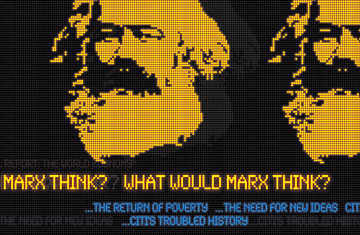
(4 of 4)
Karl Marx, to be sure, would not have thought much of the seminar. Its thrust was how to reform the existing system rather than overthrow it, and a significant part of the debate focused on how better to regulate finance and jump-start global cooperation on economic issues. But the theme of social inequality that was central to Marx's thinking also got an airing. Was it just up to governments to be smarter about redistributing prosperity among the population? Or, wondered Pascal Lamy, who runs the World Trade Organization, "is there a new paradigm, because globalized capitalism creates bigger inequalities, and the international division of labor is much stronger than in the past?" His answer: Yes, there has indeed been a shift that requires an international solution to capitalism's challenges.
One problem: when the intellectual pendulum swings, it sometimes goes too far. At the Paris seminar, Ellen Johnson-Sirleaf, the President of Liberia, sketched out how Africa swung from state control of the economy in the 1960s and 1970s to an embrace of deregulation and other neoliberal policies starting in the 1980s. "History has not been kind to the strong version of state control," she said, "but the enthusiasm for deregulation went too far." In some places, privatization of water and electricity simply replaced public monopolies with private ones. "History has shown that neither of the extreme versions is right," Johnson-Sirleaf added. "We need a proper balance that evolves over time."
The Head in Highgate Cemetery
Marx moved to London in 1849 and spent the last 34 years of his life there, much of it in the Reading Room of the British Museum, where he studied official reports of the miseries of British industrial workers and wrote most of his best-known works, including the first volume of Das Kapital. Engels was an important influence: he had studied factory life in Manchester for his critical work The Condition of the Working Class in England. The two men considered England's form of capitalism to be especially advanced, and erroneously expected it to be the first country to undergo a socialist revolution. (See pictures of 250 years of the British Museum.)
The Reading Room's books were transferred in 1997 to the new British Library near St. Pancras station. The move coincided with a critical intellectual transformation in Britain: the rise to power of Tony Blair's New Labour and the end of the last vestiges of Marxism as a political force in Britain. Germany's Social Democrats made their decisive break with Marxism in 1959, but antimarket currents lingered on in the British Labour Party until Blair and Gordon Brown, the current Prime Minister, banished them by embracing London's financial district, encouraging business and financial innovation, and granting political independence to the Bank of England. With the banking system in need of help, some antimarket feeling is resurfacing, and a number of Labour MPs have been arguing the need for a broad nationalization of banking and industry.
Brown's political opponents on the right are also on the attack, but much of the criticism is coming from another source: church leaders, including the Archbishop of Canterbury, Rowan Williams, who harbors an unlikely sympathy for a man whose followers adopted atheism as a state creed. "Marx long ago observed the way in which unbridled capitalism became a kind of mythology, ascribing reality, power and agency to things that had no life in themselves; he was right about that, if about little else," Williams wrote in an article published the week after the collapse of Lehman Brothers.
Marx's grave in London's Highgate Cemetery is marked by a bronze bust of the man on a gray granite plinth, commissioned by the British Communist Party and unveiled in 1956. Inscribed in gold is a quotation: "The philosophers have only interpreted the world in various ways. The point however is to change it." At nearby St. Michael's Church, vicar Jonathan Trigg says many members of his congregation work in financial or financial-related jobs, and "are very anxious" about the future. What do they think about the need to change the world? "Any intelligent person should ask questions about values," Trigg says. "Boom times can lead to collective delusion, and everyone gets caught up in it." Karl Marx couldn't have put it better himself.
— with reporting by Adam Smith/London